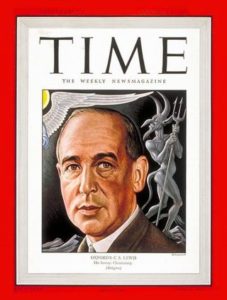 As C.S. Lewis states in The Abolition of Man, once you step outside of the Tao, by which he means the world of objective value, you and your civilization fall ultimately down a slippery slope into the abyss of value indeterminacy and the rule of a Nietzschean will to power. According to Lewis, “A dogmatic belief in objective value is necessary to a rule which is not tyranny and a servitude that is not slavery.” Value relativism leads to the tyrannical rule of gut feeling, the raw nature of randomly moving atoms, and science, in its modern manifestation of technological will to power over the nature of men. By that statement, a dogmatic belief, i.e. a belief in something that in all likelihood is not or only partially true, has to be a prerequisite for any kind of solemn remembrance, since value indeterminancy would make the ability to assign value to past occurrences very difficult. A couple of weeks ago, Harper’s ran this great piece “9/11 The Limits of Remembrance” on remembering 9/11. This passage especially struck me:
As C.S. Lewis states in The Abolition of Man, once you step outside of the Tao, by which he means the world of objective value, you and your civilization fall ultimately down a slippery slope into the abyss of value indeterminacy and the rule of a Nietzschean will to power. According to Lewis, “A dogmatic belief in objective value is necessary to a rule which is not tyranny and a servitude that is not slavery.” Value relativism leads to the tyrannical rule of gut feeling, the raw nature of randomly moving atoms, and science, in its modern manifestation of technological will to power over the nature of men. By that statement, a dogmatic belief, i.e. a belief in something that in all likelihood is not or only partially true, has to be a prerequisite for any kind of solemn remembrance, since value indeterminancy would make the ability to assign value to past occurrences very difficult. A couple of weeks ago, Harper’s ran this great piece “9/11 The Limits of Remembrance” on remembering 9/11. This passage especially struck me:
It is important not to exaggerate. Whatever meaning history eventually assigns to the attacks of 9/11—and though they are often conflated, history is the antithesis of remembrance—it is highly unlikely that these commemorative events will do any harm to America as a society, even if there is not likely to be very much to learn from it either, any more than there is from eulogies at a funeral. And in an important sense, for the relatives and friends of those who died on that day, remembrance will surely afford some measure of recognition and consolation, though of course not of closure, which is one of the more malign and corrosive psychological fantasies of our age. (The Latin phrase “De mortuis nil nisi bonum,” “Of the dead speak only well,” has often been parodied with the quip, “De mortuis nil nisi bunkum,” but this is wrong. There is nothing admirable about candor during a commemoration, just something childish and conceited.) Remembrance is not valued for shedding much light on the truth in all its nuance and ambiguity. And that is entirely appropriate. The problem is both the degree to which remembrance nourishes illusions about how long human beings can remember and, far more seriously, the potentially grave political and historical consequences it can engender. After all, to remember may not just mean to grieve; it may also mean to harbor a vision of securing justice or vengeance long after it is time to put the guns away.
My point is that whatever speeches and eulogies we will hear in the next couple of days, their main purpose will be remembrance – not critically investigating ‘the truth’ or justness of U.S. Foreign Policy. I say that because I can already picture in my head the comments by the likes of Tariq Ali in this weekend’s newspaper editions stating: “To the victims of the attack and their relatives one can offer our deep sympathy, as one does to people whom the U.S. government has victimized.” (note the absence of a period after sympathy). Let’s for a brief period cast aside world politics and just remember. And lest we forget, Percy’s poem Ozymandias provides a beautiful reminder on the ultimate futility of remembrance:
I met a traveller from an antique land, Who said–“Two vast and trunkless legs of stone Stand in the desart….Near them, on the sand, Half sunk a shattered visage lies, whose frown, And wrinkled lip, and sneer of cold command, Tell that its sculptor well those passions read Which yet survive, stamped on these lifeless things, The hand that mocked them, and the heart that fed; And on the pedestal, these words appear: My name is Ozymandias, King of Kings, Look on my Works, ye Mighty, and despair! Nothing beside remains. Round the decay Of that colossal Wreck, boundless and bare The lone and level sands stretch far away.”